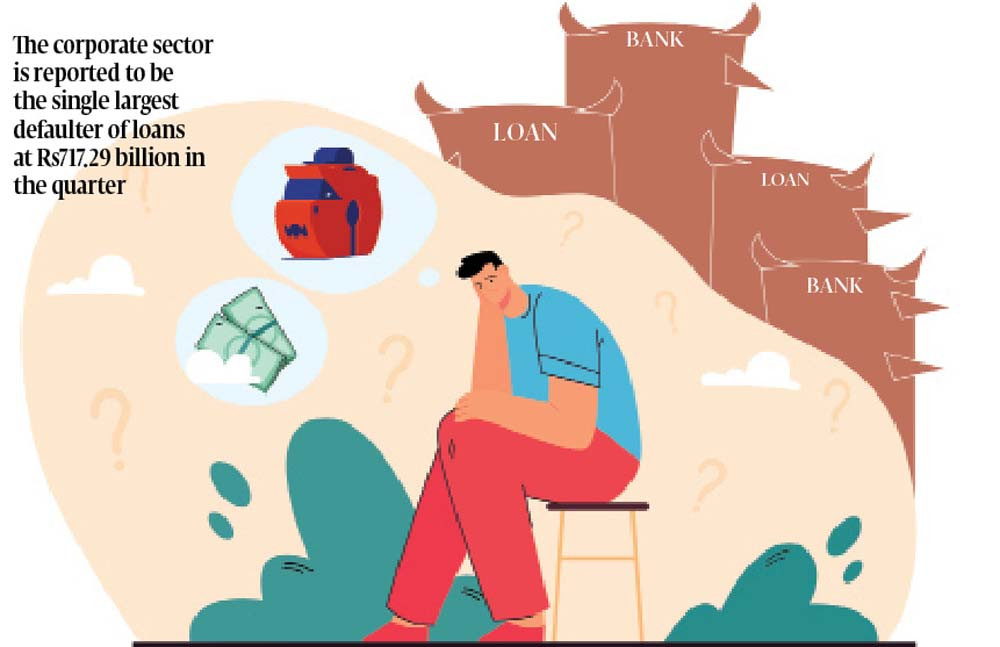Banks battle rising non-performing loans
NPLs have increased by almost 3% to Rs938.67 billion in the quarter ended December 31, 2022

The cost of living and cost of doing business in Pakistan have risen significantly in recent times, leading to a surge in non-performing loans (NPLs) and causing banks to suffer losses.
According to the State Bank of Pakistan (SBP), all banks and development finance institutions’ (DFIs) NPLs have increased by almost 3%, or Rs25.53 billion, to Rs938.67 billion in the quarter ended December 31, 2022, compared to Rs913.14 billion in the previous quarter ended September 30, 2022.
More importantly, the net NPLs have also recorded a significant rise of 32%, or Rs23.90 billion, to Rs98.69 billion in the December quarter, compared to Rs74.79 billion in the previous quarter. Banks begin recording NPLs after borrowers fail to repay loans for at least three consecutive months.
Another set of data suggests that banks have lent Rs12.65 trillion to the corporate and households in the quarter ended December 2022, while NPLs rose to Rs924 billion, showing the infection ratio stood at 7.3 in the quarter.

design: mohsin alam
The corporate sector is reported to be the single largest defaulter of loans at Rs717.29 billion in the quarter, followed by small and medium-sized enterprises (SMEs) at Rs74.85 billion. The agriculture sector’s NPLs stood at Rs55.80 billion, while the consumer sector’s (credit cards, auto loans, consumer durable, mortgage loans and others) NPLs stood at Rs32.16 billion. Commodity financing (for cotton, rice, surge, wheat and others) NPLs stood at Rs7.25 billion, while NPLs coming from banks and DFIs’ own staff were recorded at Rs2.65 billion in the quarter ended December 31, 2022.
Speaking to the Express Tribune, Arif Habib Limited Economist Sana Tawfik highlighted the textile sector as one of the largest banks’ defaulters in recent times. The textile sector alone attracts around 60% of the total export proceeds and remains the single largest export earning sector of Pakistan. “NPLs have become a significant concern for banks in the current fiscal year amid the high economic crisis in the country,” she said, adding that, the capacity of households and corporates to repay loans has been badly weakened due to inflation being recorded at historical highs of 35.4% in March, coupled with an all-time high markup rate (the benchmark six-month Karachi inter-bank offered rate/Kibor) at 22%. Such numbers were also alarming in the quarters under review.
The size of interest money on the borrowed money has increased significantly with Kibor hovering at 22% compared to almost half of it about a couple of years ago during Covid-19 times.
She said the high inflation reading and high interest rate have multiplied the cost of living and the cost of doing business. Accordingly, millions of people have lost jobs, while a large number of factories are lying partially or completely closed. Tawfik said that many households and businesses are failing to repay their loans to banks. Quoting a leading bank, she said, it was almost impossible for a large number of clients to return personal loans like car financing at this time when the Kibor has shot to a record high of 22%.
Some banks have offered their clients the option to defer payment of the principal amount of the loan for a couple of months but continue to pay interest money to survive in the crisis. They are also offering clients the option to restructure the debt, meaning setting a new schedule for the repayment of the loan and the interest money.
This way, the banks are not only saving themselves from heavy losses and a likely collapse of weaker financial institutions, but they are also saving their clients who remain a source of income in the long run. The SBP data suggests that all banks and DFIs have recovered Rs33.39 billion in the December-end quarter compared to Rs18.23 billion recovered in the previous September-end quarter.
She said, the banks had estimated non-performing loans worth billions of rupees on their balance-sheet during the testing times of Covid-19 to efficiently manage the NPLs crisis. They are now reversing the NPLs on the balance-sheet after the NPSs were recorded less in actual than their estimates. Sometimes, some of the borrowers manage to repay the loans through negotiated deals later on. This also help banks recover some of the NPLs.
Published in The Express Tribune, April 2nd, 2023.
Like Business on Facebook, follow @TribuneBiz on Twitter to stay informed and join in the conversation.



1733130350-0/Untitled-design-(76)1733130350-0-208x130.webp)















COMMENTS
Comments are moderated and generally will be posted if they are on-topic and not abusive.
For more information, please see our Comments FAQ